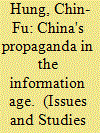| Srl | Item |
| 1 |
ID:
106256


|
|
|
|
|
| Publication |
2011.
|
| Summary/Abstract |
Ever since the Mao era, propaganda has been the primary vehicle in China for the indoctrination and mass mobilization of citizens. In the last few years however, as China has continued to open up to the outside world and deepen its reforms, it has experienced an unprecedented boom and liberalization of its media sector. While the propaganda regime continues to attempt to guide and shape public opinion, the conventional propaganda apparatus is not as effective as it used to be. This has given rise to a new governing mechanism that employs Internet commentators to direct cyber discussions and create favorable online opinions about the party-state. Accordingly, this paper addresses the new phenomenon of Internet commentators and argues that the creation and increased utilization of such commentators has provided the Beijing governmentwith an up-to-date tool for disseminating and reinforcing party ideology and thought work in the information age. A case study of the Weng'an incident is discussed as a means through which to explore China's propaganda regime.
|
|
|
|
|
|
|
|
|
|
|
|
|
|
|
|
| 2 |
ID:
139641


|
|
|
|
|
| Summary/Abstract |
Studies on public expression in China tend to focus on how the state and internet users (netizens) struggle over the limits of online expression. Few have systematically traced discourse competition within state-imposed boundaries, particularly how the authoritarian state has adapted to manage, rather than censor, online expression. This paper explores and evaluates the state’s attempts to manipulate online expression without resorting to censorship and coercion by examining the role of internet commentators, known as the “fifty-cent army”, in Chinese cyberspace. To cope with the challenge of online expression, the authoritarian state has mobilized its agents to engage anonymously in online discussions and produce apparently spontaneous pro-regime commentary. However, due to a lack of proper motivation and the persistence of old propaganda logic, this seemingly smart adaptation has proven ineffective or even counter-productive: It not only decreases netizens’ trust in the state but also, ironically, suppresses the voices of regime supporters.
|
|
|
|
|
|
|
|
|
|
|
|
|
|
|
|